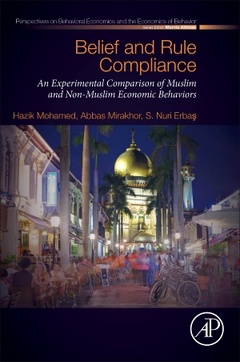Belief and Rule Compliance An Experimental Comparison of Muslim and Non-Muslim Economic Behavior Perspectives in Behavioral Economics and the Economics of Behavior Series
Auteurs : Mohamed Hazik, Mirakhor Abbas, Erbaş Nuri

Belief and Rule Compliance: An Experimental Comparison of Muslim and Non-Muslim Economic Behavior uses modern behavioral science and game theory to examine the behavior and compliance of Muslim populations to Islamic Finance laws and norms. The work identifies behaviors characterized by unexpected complexity and profound divergence, including expectations for sharing, cooperation and entrepreneurship gleaned from studies. Adopting a unique set of recent empirical observations, the work provides a reliable behavioral foundation for practitioners seeking to evaluate, create and market Islamic financial products.
1. Introduction2. Rules of the Game3. Game Theory and Human Behavior4. Markets and Investment Behavior5. Game Theory and Testing for Rule Compliance6. Rule Compliance and Institutional Quality7. Economic and Institutional Applications8. Conclusion
Primarily behaviorally-minded Islamic Finance specialists. Fund managers and financial product developers working with Islamic investments. Policymakers and regulators. Behavioral economists interested in exploring the impact of belief and religious-priming on economic behavior. Some graduate and 1st year PhD students in economics or behavioral economics.
Abbas Mirakhor is the former holder of the First Chair of Islamic Finance at INCEIF in Malaysia, where he mentored and supervised 17 Ph.D. candidates, amongst other duties. He was formerly Dean of the Executive Board and retired as an Executive Director of the International Monetary Fund (IMF). He has held past professorships in Alabama A&M and Florida Institute of Technology. Mirakhor has published widely across microeconomic theory, mathematical economics and Islamic economics. He is the author, contributor and editor of numerous books, journals and articles, with much of those diverse research converging towards risk-sharing.
S. Nuri Erbas was a Senior Economist at the IMF. He also held academic positions at the Universities of Hawaii, Houston, Maryland and INCEIF. His most recent research is on Saudi Arabia’s labor markets and decision-making in ambiguity. He holds a Ph.D. in Economics from Columbia University in New York and is the recipient of 1975 Rectorate Award from Bogaziçi University, Istanbul.
- Covers the economic behavior of Muslims and non-Muslims
- Indicates when, and if, economic behavior confirms/opposes rational self-interest assumptions
- Links rule compliance with risk sharing concepts in Islamic Finance
- Applies game theory to understand behavioral rules compliance regarding Islamic Finance laws
- Explores behavioral implications for creating and marketing new financial products
Date de parution : 09-2018
Ouvrage de 233 p.
15x22.8 cm
Thèmes de Belief and Rule Compliance :
Mots-clés :
Behavioural applications; Behavioural economics; Beliefs; Core values; Culture; Economic prosperity; Emotions; Enforcement; Experimental game theory; Future direction; Institutional analysis framework; Institutional nudges; Investment biases; Islamic economics; Limitations; Mental frames; Neoclassical economics; Priming instrument; Prospect theory; Psychological obstacles; Recommendations; Reputation; Risk preferences; Rule compliance; Rules of behaviour; Social network; Spiritual enlightenment; Statistical analysis; Summary


